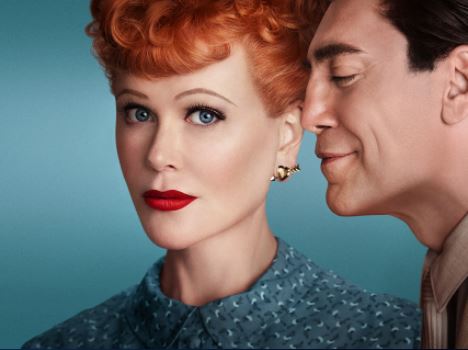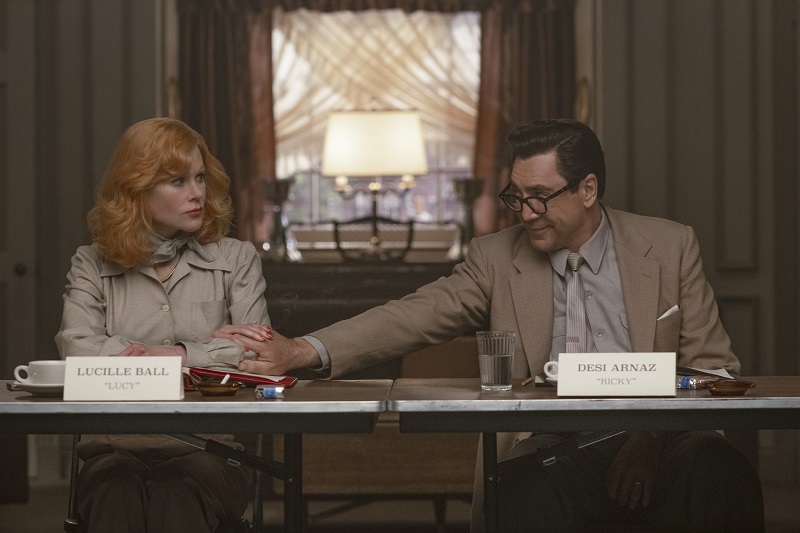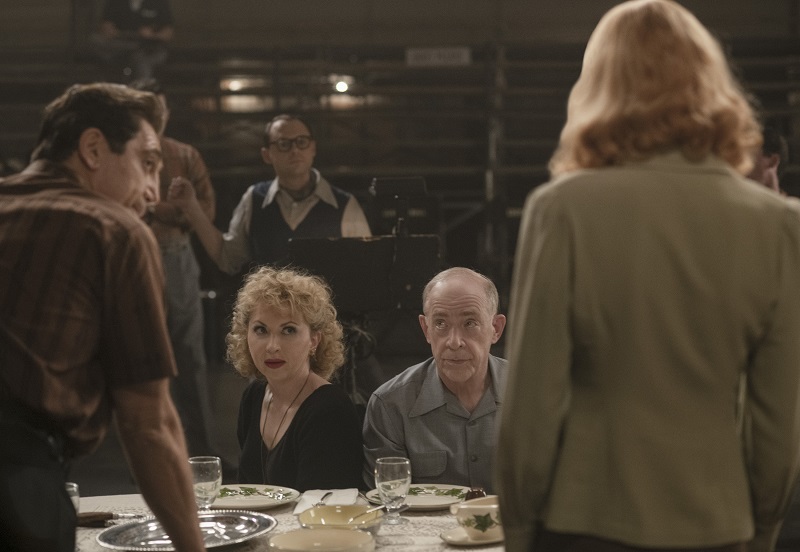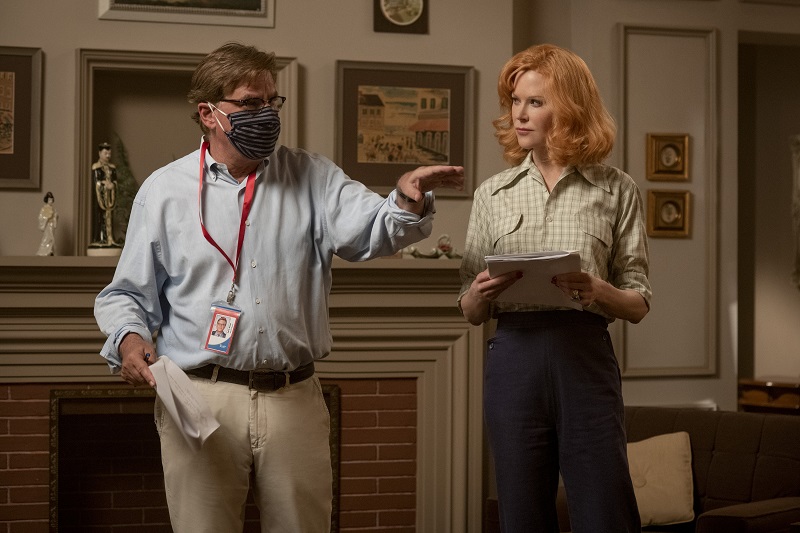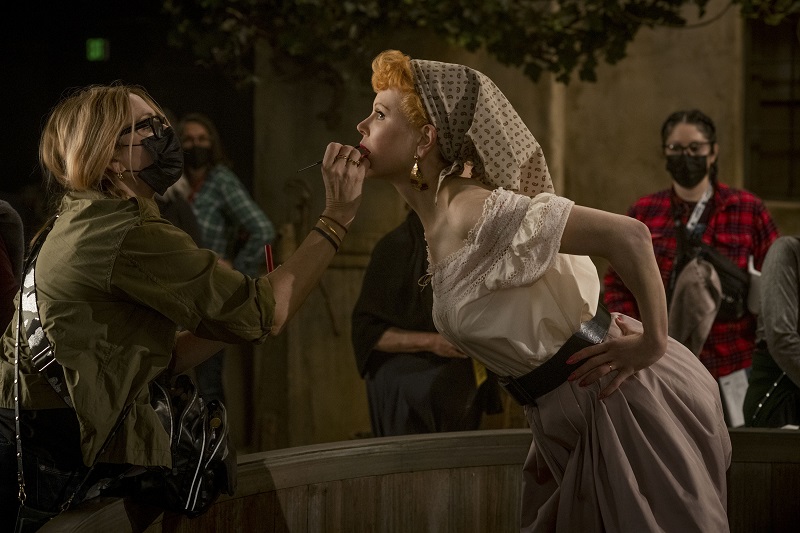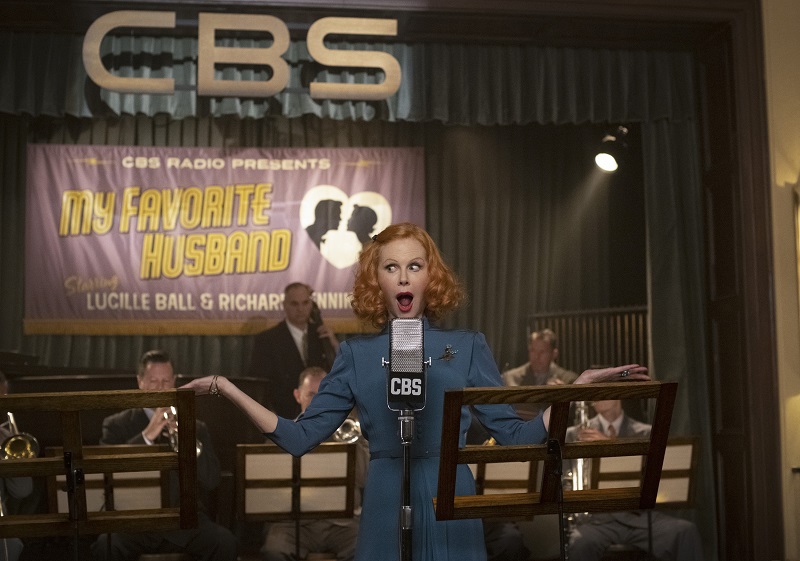There is an aspect within the institution that are biopics that is a huge pet peeve of The Movie Mensch. Let’s just get that right out of the way. Nobody is ever remaking one, so you better get it right the first time. That is exactly what occurs with the Aaron Sorkin written-directed Being the Ricardos and its chronicle of Lucy Ball and Desi Arnaz. The duo were household names with their smash television program, I Love Lucy. How huge was that show? It astonishingly averaged 60 million viewers a week in the late 50s and early 60s.
Unlike many biopics that focus on an individual’s entire life, which can bite off way more than it can chew, Sorkin’s picture focuses on what could be described as the most important week in the life of Lucy and Desi. Their show was the hugest thing to come to televisions since they turned on. News was about to break that Lucy had registered as a Communist Party Member in the early thirties as a tribute to her step-father, a man she greatly admired.
Although the House Un-American Activities Committee cleared her, this is a scandal that has seen many of that time period’s writers, directors, stars, or crew very publically canceled. Without a fair trial and instead of one was held in the court of public opinion, spurred on by what was currently going on with Senator Joe McCarthy in the 50s.
There’s also the problem for Ricky and Lucy that involves a paparazzi-driven magazine running a front-page report about Arnaz and his philandering ways. Ball had always suspected there were others, but as portrayed in Being the Ricardos, we are told that the couple was either “ripping each other’s throats out… or their clothes.”
The chemistry between Sorkin’s two leads is flawless and impeccable.
There was a hubbub when Nicole Kidman was cast as the famous redheaded comedienne. There is something stunning about her performance. It concurrently pays tribute to the legend while amazingly humanizing and most important of all… illustrating why she was so astutely intelligent and had a sixth sense gift when it comes to comedy
Sorkin establishes the cost of what is swirling around the Ricardos and it’s beyond repairable destruction. It is equal for both of them, but each of their “punishments” will be diverse, just as they are. For Ricky, he has spent his entire professional career professing his love for the red, white, and blue. As a foreigner, (particularly from Cuba, a communist country) who has worked his talented tail off to get where he is, the way in which Sorkin captures this week and the means with which Ricardo utilizes his clout, is mesmerizing and a revelation, to say the least.
Bardem is every bit the lothario to the public that Ricky was known for inhabiting as a personality. He was married to America’s sweetheart, but rumors swirled about infidelity, but as he is portrayed in Being the Ricardos, he is a doting father, supporting husband most importantly an equal part in the Desilu Productions and someone who’s sense for what’s funny was innate.
Of course, it wasn’t in the same league as his wife. As Sorkin illustrates in his film, he absolutely knew his place in the cog of their entertainment machine. For an immigrant whose allegiance to his country (including serving in World War II) is well documented, that was enough. But there are scenes where Ball’s ingenious comedic sense and timing shine through and Sorkin is smart to spotlight this part of what made the comedienne an icon. My only complaint is that was more of that in the picture to convey to the public the impact that Lucille Ball had on comedy, television, and culture in general.
The ensemble in Sorkin’s Being the Ricardos is sublime. From J.K. Simmons (Whiplash) as William Frawley, who played Fred to Nina Arianda’s stellar turn as Vivian Vance. Tony Hale is also exceptional as the showrunner and executive producer Jess Oppenheimer. There’s a lot of talk about Simmons for the Academy Award for Best Supporting Actor and Lord does he deserve it. But… might we suggest a spot for Hale as well. The way he manages a circus at the height of its insanity and popularity is a lesson in balancing the needs of a character within the parameters of a story.
Then, there’s Arianda as Vivian. On the show, she was depicted as the “dumpy” sidekick to Lucile’s glamourous wife to a pop star. That aspect is addressed intensely throughout Being the Ricardos and reflects a time in Hollywood where looks were all-important, but you didn’t want to look too good. She is sensational.
While the swirl of career-ending scandal is out there in the world, Sorkin weaves his web within the confines of I Love Lucy. As such, the impact of what is happening to them feels like a tsunami. What exactly are they are going to do about it? From meeting with sponsors to the network’s legal team—Sorkin handled it all in a way that screams urgency. All the while… they’re trying to prepare for a live show. Did we mention that Frawley and Vance famously despised each other? That’ll help things this week.
Sorkin has long written some of the most elegant dialogue that has ever graced the screen—both small and large, as well as the theater. That is firmly the case here but is within a subject matter that seems a bit surprising. As such, it is what feels like an independent look at a pop culture sensation, a marriage, fame, and what it took to put on a successful television show at the turn of the 60s. Throughout this week in Sorkin’s I Love Lucy world everything is so fluid day to day, hour to hour, for Ricky and Luci—and everyone employed by the smash hit show.
The storyteller enlightened us with the stage version of A Few Good Men (and the film version starring Jack Nicholson, Demi Moore, and Tom Cruise), then he gifted us Sports Night, the culturally transcendent West Wing, and made the leap to film after Men, penning The American President, The Social Network, and Moneyball with Brad Pitt, Steve Jobs, then he made his directorial and screenwriting debut with the true story, Jessica Chastain starring Molly’s Game, and then last year’s true tale stunner The Trial of the Chicago 7. Oh, and did we mention he was the man behind HBO’s gift to the television medium that was The Newsroom.
With Being the Ricardos, it may seem like a unique landscape for Sorkin to wield his titanic talent. The thing is, what Lucy and Ricky experienced and overcame, all while the country was on a witch hunt worthy of comparison to the Salem Witch Trials, is something to be celebrated and encased in the eternity that the entity of film.
There’s also the fact that Lucy was married to a Latin man, a Cuban (a communist country). She was the epidemy of Americana in the 1950s and her love affair was clearly accepted. But no one with the show wanted to push it. It was a huge deal, even when Ball became pregnant. Should it be hidden or not? The fact that Little Ricky’s birth was the highest-rated television program in history (at the time) says it all.
When it comes to the “Red” scandal, that is handled with just the right touch by Sorkin. Sure, the couple’s raging popularity helped immensely. But there were plenty of American entertainers whose careers were ruined by McCarthy and his cronies.
With Sorkin’s Being the Ricardos, the storyteller does an outstanding job at capturing what it was that made Lucy and Desi so beloved and popular. What we could have used a little more of was the salutes to Ball’s brilliance with comedy. There’s a particular scene where she calls Frawley and Vance to the set because she had some inspiration in the middle of the night. Sorkin brilliantly shoots his movie in color but utilizes the landscape of black-and-white to illustrate what aired on television. Yes, Ball’s 2:30 a.m. comedic realization made the show and yes, made it funnier and better in general.
There could have been more of that from Sorkin’s film. The movie does a solid job of introducing a new generation to the Ricardos, why they were important, and how America (and the world) loved them. But in a biopic about Lucy Ball and Desi Arnaz that teases Ball’s comedic superiority to almost everyone working then (or since), there should have been more than just a few moments where that aspect of what it meant to be Lucille Ball was highlighted.
If there was a complaint of the experience that is Being the Ricardos, it is that there isn’t enough that celebrates the brilliance of Ball. It’s sprinkled throughout and yes, this is about one week in the life of one of our greatest pop culture personalities, but her sense of timing, comedic translation through the medium of television, was uncanny. The scene where that is obviously exposed is one where Sorkin and Being the Ricardos are at their very finest.
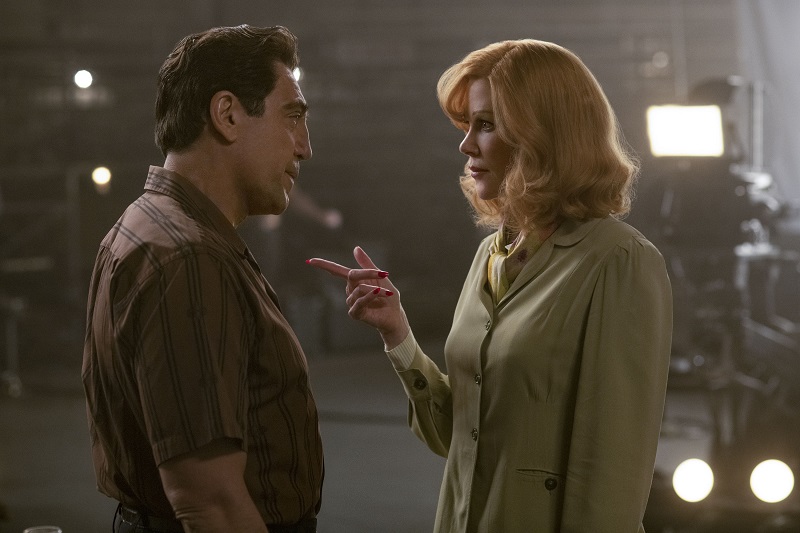
The film truly is like an all-access pass to Hollywood and making a hit TV show for one week in the late 50s. For example, viewers are treated to a front-row seat in the writing room. It is an education. First, there’s Jake Lacy’s Bob Carroll (played by Ronny Cox as an older gentleman), who is a “green” comedy writer whose inferiority complex with Madelyn Pugh (Alie Shawkat) is symbolic of gender place workplace issues of the time, especially in entertainment and the world of comedy. Alice is played by Linda Lavin in her 70s. Hearing from these characters, as they break the “fourth wall,” such as Carroll and Pugh… who were there, wax poetic about their time on the show adds an invaluable dimension to Sorkin’s vision. It feels documentary-ish and never distracts. It’s a risky move by Sorkin in that it could have easily achieved the opposite. The creative decision pays off emotively, narratively and adds layers to the overall cinematic process.
Bardem expertly defers to his wife when it comes to the show, and he handles the business end of things. It, like Being the Ricardos, works immensely. The thing is—spoiler alert—Lucy would end up divorcing Ricky over those infidelity issues and the future for both was successful, yet unique. Being the Ricardos works so well because of that smart biopic movie method of focusing on one moment in time that not only defines the characters in terms of their relevance pop culturally, but everything is simultaneously defining and wholeheartedly entertaining.
Kidman is divine. We are so thrilled that she didn’t listen to those armchair casting directors and her inner gut and dive into this American institution known as Lucy Ball. The actress almost quit! She says so much with so little. Don’t get me wrong, Lucy says plenty. Those moments in the movie where she is working out maximizing the comedic aspect of her show, thinking about whether to believe Ricky or simply reflecting—are often handled without Kidman having to say a word. There are few actresses who can accomplish such a feat.
One of the best aspects of Being the Ricardos centers on the Australian actress’ keen ability to have us forget that we are witnessing an Oscar winner portraying an American icon within 90 seconds. Kidman gets lost in the role, and so do we.
Grade: A-

